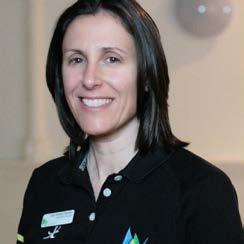
3 minute read
Safeguarding Newsletter
ISSUE 15: March 2023
The Safeguarding Team
Advertisement
Designated Safeguarding Lead (DSL)
Delyth Lynch
Deputy Head (Safeguarding)
Biology
07825 419190
Deputy DSL
David Walker
Deputy Head (Pastoral & Wellbeing) Physics 07717 765343
Deputy DSL
Ed Venables
Director of Admissions Economics
07766 168286
Assistant Deputy Head
Safeguarding & Head of Online Safety
Jess Goves P&R teacher 01344 751774

Deputy DSL
Tom Wayman
Assistant Head (Pupils)
English 07766 448086
Deputy DSL
Gaby Moretti Chambers
Operations Manager (Wellington Health & Fitness Club)
01344 444243
If you are concerned for a child’s welfare, health or safety or if you have concerns about the behaviour of any adult – parent, member of staff or member of the general public – please contact the Designated Safeguarding Lead or a Deputy immediately.
A note from the DSL
On the 7th February, we celebrated Safer Internet Day. Now in its 20th year, many of you will have seen certain aspects of the campaign on social media, with the theme this year being ‘Want to talk about it? Making space for conversations about life online.’ National days are sometimes met with an eye roll and a “not another awareness day”, especially by the ever-cynical teenager, however Safer Internet Day has had real world impacts that have affected millions of children and in 2022 they pushed #SaferInternetDay to the top of the twitter trending chart for that day. The safeguarding team has devoted most of this newsletter to online safety so that we can really raise awareness in this area. We hear all too often that online safety is not just a matter for teachers to educate pupils but for parents to also take responsibility. We hope to be able to highlight some of the amazing resources that are out there for you and raise the importance of parental engagement in this hugely important area of safeguarding. The Assistant Deputy Head (Safeguarding) Jess Goves is leading brilliantly in this sphere and I am delighted to have co-written this edition of the newsletter with her; if you have read this far and are about to press the small cross in the right hand corner, please don’t – children today are, whether we like it or not, living their lives online and through social media. We must be part of that journey with them, and we must understand what they have access to so that we can engage in meaningful conversations and provide the handrails for them to navigate the online landscape safely.
As a team we try to use data to help us to be proactive. When we analysed our safeguarding data
Year Group Issues
3rd Form Relationships and Friendships; child on child harm (bullying) from Lent 2022, the main issues affecting year groups during February and March were as follows and we have highlighted how you might be able to help and be proactive safeguardians as well! Our ‘Staying Safe’ survey highlighted just how many of our students would speak to their parents about something which was bothering them at school – you are all an incredibly important cog in the safeguarding wheel.
What can you do?
Be there to listen. If you feel that your child wants to say something, ensure that you are present. Take what they say seriously and report any concerns about other student behaviour to the HM, tutor or a member of the safeguarding team (Tom Wayman is our lead on discipline).
If your son or daughter is talking about another student who is struggling, don’t just ignore it. Empower them to take action and help; be there for them as they think about the decisions they might make.
Do not be afraid of having a word with your child’s HM if you have serious concerns about another student. HMs can deal with disclosures sensitively and delicately. If you would rather speak to someone outside of the house, do please contact any member of the safeguarding team.
4th Form Sexting (or the sharing of ‘nudes’)
Speak openly about sexting. Talk gently to them about the law and ascertain their understanding – perhaps using a story which has been in the news which they may relate to. Encourage an open dialogue so that if they do find themselves with a problem or in danger, they will tell you and they will know that the response will be a supportive and kind one.
Upskill yourself with knowledge around this area so that you feel comfortable and can speak from a position of understanding. Watch the National Online Safety video (via your NOS login) available to all parents: ‘What parents need to know about sexting’.
5th Form Alcohol (and subsequent issues arising after drinking too much)
If you are hosting a party for your son or daughter do re-read the Second Master’s letter which contains guidance on how to go about ensuring that you are keeping your child – and others – safe from harm.
There is some excellent information for all parents about alcohol and how to navigate conversations about it on the Alcohol Education Trust webpage: https://alcoholeducationtrust.org/ They also have a page on parties: https://alcoholeducationtrust.org/parent-area/teenage-parties/
6th Form Sexual harassment, sexual violence (outside of school at the weekend)
Have open conversations about the topic – it is relevant for boys and girls. Ask them about their sex and consent workshops and create opportunities to discuss potential areas of concern. There is an online talk for parents by Ella Simms (Colourful Peach) on the 18th May (7pm) and some useful guidance here: https://www.childrenscommissioner.gov.uk/report/talking-to-your-childabout-online-sexual-harassment-a-guide-for-parents/ https://parents.actionforchildren.org.uk/stages-development/socialemotional-development/talking-sexual-harassment/
If you would like confidential advice, please do use the NSPCC helpline; it is excellent: 0800 136663.
As always, please don’t hesitate to get in touch with the team if you would like some help or simply share your thoughts.
Stay safe,




